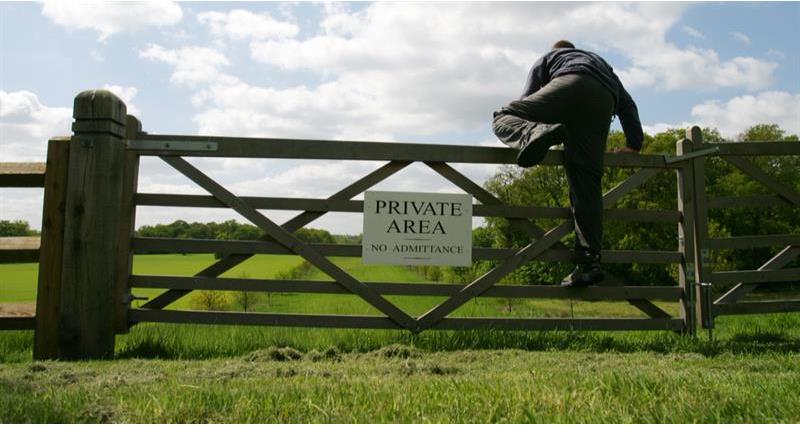Contact Crimestoppers to give information anonymously about rural crime. Submit information online at www.crimestopper-uk.org or call them on 0800 555 1111.
Use these links to jump to a particular section:
Fly-grazing | Activism | Illegal encampments | Trespass | Who to call and when | Member discounts | Read more
Fly-grazing
Fly-grazing is the practice of grazing horses on land without the permission of the landowner or occupier. Criminal damage is often carried out to gain access to grazing land, and the practice is often associated with poor horse welfare.
When a horse is left on land, the owner or occupier may become legally responsible for its welfare, which includes feeding and caring for it and ensuring its safety and security. In practical terms, this could mean spending time and money on securing fencing, ensuring an adequate supply of food and water, as well as paying for any veterinary services.
Steps you can take to prevent fly-grazing:
- Limit access to land: Blocking field entrances or digging strategic ditching will make land less attractive, but be aware of blocking public rights of way or other land management requirements, including cross compliance.
- Display notices: Make it clear that fly-grazing will be dealt with. Fly-grazers will usually avoid land where they know robust action will be taken. The NFU has produced such notices for its members - contact CallFirst 0370 845 8458 to order signs.
- Empty or disconnect water troughs: Do not do this if the horse is already on the land as you may be causing welfare issues.
- Focus on the fields most at risk: Pasture will be more attractive than ploughed land. Consider using CCTV where there is a recurring problem.
- Check your insurance: Some insurers provide cover for the costs associated with a fly grazing incident.
What to do if you have problems with fly-grazing on your land:
Contact NFU CallFirst 0370 845 8458 to speak to one of our specialist advisers who will provide initial advice on your legal position and outline the options available to you.
It is not straightforward to remove a horse from land for the following reasons:
- You cannot return the horse unless you know the owner and they are willing to have it back.
- You cannot sell the horse without a valid horse passport.
- Charities often cannot take horses as they are already overrun with abandoned horses.
It is important that you carry out the procedure for removing horses correctly. The most advisable course of action will be to employ a specialist horse bailiff who will carry out the procedure for you, reducing the risk of confrontation or retaliation from the horse’s owner. The cost of removal is significant, and for this reason the NFU offers a member discount with one of the leading bailiff companies.
The procedure for removing a horse from your land yourself is too extensive to list here, but further information can be found in the NFU Fly-grazing Farmer Information Pack and Business Guide on Livestock Straying and Trespass to Land (Including Fly-Grazing).
Activism
The NFU has created practical guidance for members on how to deal with activists and extremists. Please log in to download the guidance here.
Having problems logging in? Please contact NFU CallFirst: 0370 845 8458.
Illegal encampments
An illegal encampment, also known as an unauthorised encampment, is the unlawful occupation of land without permission from the landowner or occupier. This constitutes a trespass, which is a civil law matter.
The NFU has produced an Illegal Encampment Farmer Information Pack for members which contains information regarding police and local authority powers, possession orders and GRC Bailiffs.
Trespass
Denying criminals the ability to commit crime on farmland or associated property seems like an obvious approach to take, but there are a number of issues to consider before members carry out plans to protect their property.
Some methods put into practice involve digging ditches around a perimeter of a field or compound; barriers in front of access points such as logs, old machinery and even reinforced gates and special barriers have become an increasing trend to deter would be criminals.
The NFU has put together a briefing to guide members on appropriate forms of access restrictions. It covers:
- Existing initiatives
- Land management scheme considerations
- Environmental considerations
- Planning considerations
- Rural Payments Agency (RPA) guidance on the creation of ditches
You can also download our Business Guide on Livestock Straying and Trespass to Land (Including Fly-Grazing) here.
Who to call and when?
Urgent: If a crime is in progress dial 999.
Non-Urgent: Dial 101 to report a crime after it has taken place.
Provide information: Contact Crimestoppers to provide information 100% anonymously. You can submit information online or call them on 0800 555 1111.
NFU members are entitled to a 10% discount on GRC Bailiffs eviction fees as well as a 12.5% discount on fees if they instruct the NFU Panel Solicitors to obtain a possession order. Find out more here.
- Fly-grazing pack
- Guide on preventing access to farmland
- Find out how using what3words app could help locate crime
- Practical guidance for members - how to deal with activists and extremists
- Read the NFU's Combatting Rural Crime report
